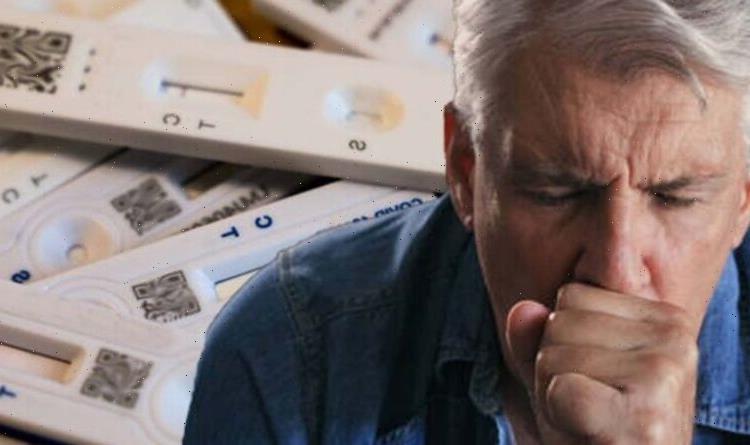Coronavirus: 'Wrong time to lift restrictions' says Greenhalgh
We use your sign-up to provide content in ways you’ve consented to and to improve our understanding of you. This may include adverts from us and 3rd parties based on our understanding. You can unsubscribe at any time. More info
Indeed, Asthma and Lung UK explains that if you are recovering from coronavirus, you might find that you have a cough for some time. It notes: “You might have a dry cough, or you might have a productive cough, which produces sputum. If you have a cough with sputum, your breathing might be noisier than normal and you may feel like it’s more difficult to breathe.”
The organisation says breathing exercises can help to clear a cough with sputum.
It suggests trying the active cycle of breathing techniques, which includes:
- Breathing control – breathing gently, through your nose if possible. Keep your shoulders relaxed
- Deep breathing – taking a long, slow, deep breath in through your nose if possible, holding your breath for 2 to 3 seconds, and breathing out gently, like a sigh
- Duffing – breathing out through an open mouth instead of coughing. To huff, you squeeze air quickly from your lungs, out through your mouth and throat as if you are trying to mist a mirror.
READ MORE: High blood pressure warning: Drug recalled as it may cause ‘adverse health consequences’

Asthma and Lung UK says you can also help keep your chest clear by trying not to stay in one position.
For example, lying on your side can often help to move the phlegm from the bottom of your lungs.
It also suggests taking any inhalers, antibiotics or steroids you’ve been prescribed and drinking enough water.
“If you are losing weight, coughing up blood, getting chest pain or if any of your symptoms are getting worse, speak to your GP or phone 111 urgently,” warns the organisation.
The NHS says: “Coughing is the body’s way of protecting the lungs and getting rid of things that irritate them. This is a normal and important function.”
Nonetheless, it notes: “Some infections can leave you with a dry cough because your lungs have been irritated.
“This should slowly disappear during the course of your recovery. It’s not clear how long after coronavirus (COVID-19) you may have a cough and it can be frustrating at times.
“A dry cough is one of the most common coronavirus symptoms, but some people may have a cough with phlegm.”

The NHS says there are lots of other symptoms you can have after a COVID-19 infection.
One common long Covid symptom is extreme tiredness, also known as fatigue. The NHS says fatigue is very common after viral infections, such as Covid and normally it settles after two or three weeks.
Other possible signs are shortness of breath, chest pain or tightness, problems with memory and concentration and difficulty sleeping.
The NHS says that other signs are heart palpitations, dizziness, joint pain, depression and anxiety and tinnitus or earache.
It says other signs can include feeling sick, diarrhoea, stomach aches, loss of appetite, a high temperature, cough, headaches, sore throat, changes to sense of smell or taste, or rashes.
The NHS says you should see a GP if you’re worried about symptoms four weeks or more after having COVID-19.
The British Heart Foundation says that there is no singular test for long Covid.
It suggests: “Make an appointment to see your doctor if you are experiencing lasting symptoms after Covid. They may refer you for tests such as blood tests and other tests, which could help to show how long Covid is affecting you and how it could be treated, or it may even be that there is another cause for your symptoms.”
Source: Read Full Article
